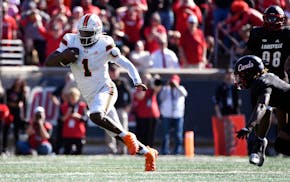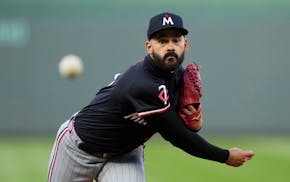The Clark Kent to Superman switcheroo was all the rage over the summer, with memes and viral videos, when gymnast Stephen Nedoroscik shed his docile demeanor to become a pommel horse phenom at the Paris Olympics.
Nedoroscik won bronze with Team USA and another bronze in individual competition on the pommel horse — all after dramatically taking off his glasses.
If the transformation felt familiar to Minnesotans, it should.
Brock Faber has been doing it for years.
"He does it [on] it seems a little higher of a stage than myself," said the nearsighted Wild defenseman, who uses contact lenses when he's on the ice, working out or playing softball in the summer.
Otherwise, Faber wears glasses and has been since he was in elementary school.
His parents suggested he adopt contacts for hockey games after Faber whiffed on an empty-netter.
"I probably just missed the open net and blamed it on my eyes," Faber said.
He has contact cases stashed at Xcel Energy Center and the Wild's practice arena, and the team's athletic trainer holds onto an extra supply of lenses.
Although the concept of beaming a laser into his eye scares him, Faber is open to LASIK.
For now, though, his glasses are his signature, just like his impressive rookie season and subsequent lucrative contract extension.
What else will Faber be known for?
How he follows up a smooth start to his NHL career, an encore that begins Thursday when the Wild face off against Columbus.
"I'm confident in myself," Faber said, "and the person I am and the player I can be one day."
Dynamic debut
Considering his journey to the Wild, Faber stayed on script by becoming an instant star.
Of course, the Maple Grove native who suited up for the Gophers after being a fan of theirs would also thrive representing his other favorite hockey team.
Faber, who was drafted by Los Angeles in the second round in 2020 before getting traded to the Wild two years later, was penciled into the lineup from the beginning of last season, but injuries to other defensemen jettisoned him up the depth chart.
He received the toughest assignments against the other team's best players. He killed penalties. He helped on offense.
He even quarterbacked the power play despite never doing so before in his career.
No challenge seemed too daunting for Faber.
Just look at his results: He tied for second in rookie scoring with 47 points and tied for first in assists (39) while averaging the sixth-highest ice time (24 minutes, 58 seconds) among all NHLers.
The 2,047 minutes and 53 seconds he logged is almost 300 more minutes than the next-closest rookie, and the most action by any rookie since the statistic was first tracked in 1997.
After the season, he finished runner-up to Chicago's Connor Bedard for Rookie of the Year, an award Faber might have snagged if he wasn't going up against the then-reigning first overall draft pick who had been buzzed about since he was barely a teenager.
"I look at last year, and I'm not necessarily disappointed," Faber said. "But I'm not ecstatic, if that makes sense. I have a lot to improve on. I have a lot to give.
"Playing in the first full year, that really helped me realize what it takes to be not only a good player but consistently dominant player in this league."
Perfect attendance
Those lessons came in a difficult season for the Wild, whose early free fall and mounting injuries snowballed into them missing the playoffs for only the second time in 12 years.
But imagine how much worse they would have been without Faber, who played the final 26 games with his own ailment.
On Feb. 20 in Winnipeg, Faber absorbed an awkward hit on the penalty kill. An MRI revealed he had two broken ribs.
For the next month, Faber woke up in the middle of the night struggling to move and breathe. But he kept playing, even though every time he got hit it felt like he was back at Square One.
There was talking of sitting him, but the decision ultimately was Faber's to make.
And knowing that he wasn't facing a life- or career-threatening injury, he chose to stay in the lineup and appeared in all 82 games.
"I feel like every guy on the team would do the same for me and for the team," explained Faber, who mended his ribs with rest over the summer. "It's important, even out of playoffs. It shows your teammates, everyone, that you're willing to show up the same way in Game 75 when it doesn't matter versus Game 7 in a Stanley Cup Final."
High-profile summer
Fast forward to the end of July, and the Wild showed the hockey world what they thought of Faber.
They christened him as their latest cornerstone with an eight-year, $68 million contract extension that'll begin next season.
After Faber skated and worked out that morning — "It was a pretty normal Monday," he said — he went to Tria Rink in St. Paul to sign the deal. His mom Karri and dad Jay were with him.
"Jay and I both teared up," Karri recalled. "We're just like, 'Holy buckets, this is real.' This is something he's dreamed of his whole life, and here we are."
Faber's life has changed, but Faber?
"He's the exact same," teammate Jake Middleton said, "which is good. He shouldn't change."
What is different, though, is how much more recognizable he is.
But that hasn't fazed Faber.
"We'll be out at a restaurant or something and someone will come up and ask for a picture," said Tyler Oakland, who became friends with Faber after they met playing hockey when they were 8 years old. "Never seen him say no. He's always super happy to do that."
As Karri pointed out, "He was that little kid not that long ago."
Eyes on the prize
Only 22, Faber should evolve as a hockey player, and he knows exactly how he'd like to grow his game.
He's striving to live up to the namesake of his position and be better defensively, including on the PK, vs. the best players.
And Faber can do that by using his feet to encroach on opponents and siphon off their time and space to handle the puck.
"He's just so explosive," Middleton said. "He's like a running back on skates, just how quick he is to close and get to pucks and make reads."
While he doesn't focus on point production, Faber believes he can continue to develop his offensive skills, and he'll get the opportunity to do so; he'll once again be running the point on the power play where he'll be tasked with distributing passes and capitalizing on open shooting lanes — determining on the fly what option makes the most sense.
If he accomplishes all that, Faber should have no problem avoiding the notorious sophomore slump.
But what will be an ideal season in Faber's eyes? He can already see it.
"Consistently playing well," he said. "Not having ups and downs. Consistently defending well, being hard to play against, being a good teammate and winning hockey games. That's really the only thing.
"That's how I consider success in my head."
Live from Vegas: Wild beat Golden Knights 5-2
Timberwolves fall to Lakers when determination arrives late in Game 2 of playoff series
Twins defeat White Sox, as usual. In the unusual category: Byron Buxton's play to end it

How changing landscape of college football manifests in the NFL draft

